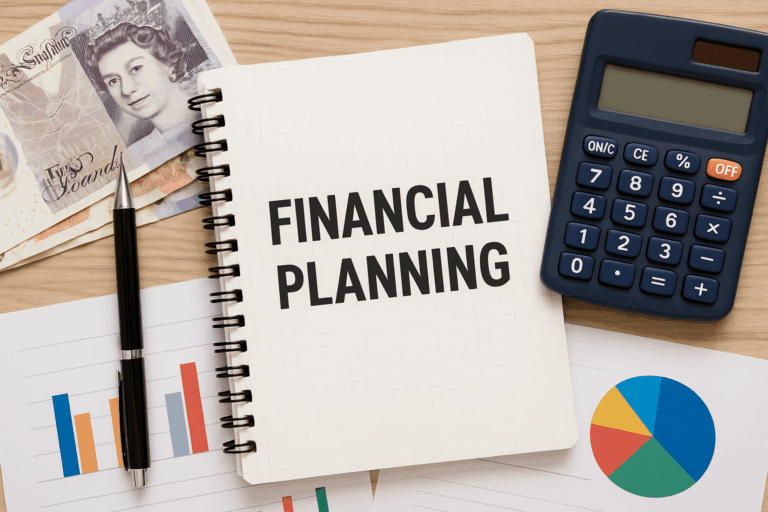
The Complete Guide to Financial Planning in the UK: Secure Your Future Today
In a dynamic economy, financial planning is not a luxury, but a necessity. Whatever your dreams – home ownership, your children’s education, a comfortable retirement, or simply a more secure future – a comprehensive financial plan can serve as a blueprint for your financial security. This concise guide is designed specifically for residents of the UK and covers all the essentials of successful financial planning.

💳 What Is Financial Planning?
At its core, financial planning is assessing your current situation, developing goals and formulating a plan to reach those goals. It includes budgeting, saving, investing, tax planning and risk management via insurance.
With reactive money management the reverse is true with financial planning—and it’s proactive. It also allows people to be smart about spending and saving, rather than lumping them into short-term fixes.
✅ The Importance of Financial Planning in the UK
Life in the UK throws up different financial planning hurdles and opportunities. Being able to manage your taxes effectively under the regulations of HMRC, your pensions and ISAs as well as gaining a clear picture of your mortgage options means that being well-versed in the UK financial landscape is crucial.
Here are the key reasons financial planning matters in the UK:
Higher Costs: Inflation can have an impact on people’s purchasing power, especially in significant cities such as London and Manchester.
Economic Instability: Economic indicators fluctuate widely including impact of Brexit and changes to interest rates from the Bank of England.
State Pension Barriers: The state pension in the UK is better than nothing, but not enough for a decent retirement.
Cost of Health & long term Care: Many services are covered by the NHS, especially health care. But long-term care itself may involve some forms of private funding.
The financial planning process in a series of simple, step-by-step stages
Take a Look at Your Finances Statements
Begin by writing down how much you earn, spend, owe and own. Knowing where your funds are going each month can help pinpoint where you can improve.
1.) Tools to Consider:
Money Dashboard or Emma like those budgeting apps
Online banking offerings from UK-based providers like Monzo or Starling Bank
2.) Set Clear Financial Goals
Goal need to be SMART chill taking pictures Specific Measurable Achievable Relevant Time bound
Examples:
Save £20k for a house deposit in 3 years
Pay off £5,000 of credit card debt in 18 months
Establish 6-months of an emergency fund
3.) Create a Monthly Budget
It makes sure you live within your means, and allocate your money towards your dreams. The 50/30/20 rule is one commonly used approach:
50% on needs (rent, bills)
Want reserves (entertainment, dining out) — These expend reserves should be as to 30% allocated toward wants.
20% toward savings or debt repayment
4.) Manage Debt Strategically
Debt can be a large obstacle to financial independence. Pay off higher interest debts first, like credit cards or payday loans.
UK Debt Management Resources
StepChange: Free help with debt and personal advice.
Here’s some help National Debtline: Can give you advice about your debt – this advice is confidential
5.) Build an Emergency Fund
Try to save at least three to six months worth of essential expenses. Put the money aside in high-interest savings accounts such as those provided by Marcus by Goldman Sachs or Chase UK.
6.) Maximise Your Savings and Investments
Savings
Turn to Cash ISAs to beat the taxman with interest. You can save up to £20,000 for the tax year 2024/2025 in ISAs via the UK government.
Investments
Look at Stocks & Shares ISAs or long-term pension contributions for growth. You can use platforms such as Vanguard UK, Nutmeg or Hargreaves Lansdown.
Important
The value of investments can fall as well as rise. And, as always, be sure to seek out a regulated financial adviser to help you make any major investment decisions.
7.) Plan for Retirement
But even if retirement still seems far away, early planning has the power of compounding. There are a number of pension schemes available in the UK:
Workplace Pensions (Auto-enrolment)
Self Invested Personal Pensions (SIPPs)
State Pension (contributions based)
Use the UK government’s pension calculator to work out what your retirement will be like.
8.) Review Insurance Coverage
Just make sure you have enough coverage to account for the unexpected. Types of insurance in the UK include:
Life Insurance
Income Protection
Critical Illness Cover
Home and Contents Insurance
9.) Tax Planning
Effective tax planning enables you to keep more of your earnings. Strategies include:
Maximising ISA allowances
The tax relief on pension contributions
Receiving of all eligible allowances and deductions
Speak to a chartered accountant or a tax adviser experienced in HMRC regulations.
10.) Review and Adjust Your Plan Regularly
Review plan and readjust Your plan isn’t in stone, so keep reviewing and changing it throughout the year.
Financial planning is not a one and done. Life events, like a new job, marriage or having kids, mean you need to periodically reassess and readjust the plan.
Create a reminder to check your financial goals every six to 12 months.
🛒 Common Mistakes to Avoid
Overlooking Inflation: If you don’t factor in the increase in prices, you can chip away at your purchasing power down the road.
- Living Without a Budget: Not having a plan can lead to overspending.
- Underestimation of Retirement Needs: There is too much reliance on the state pension for many Britons.
- Investing Without Doing Your Homework: Acting impulsively without researching the investment can end in catastrophic failure
📉 Is an Financial Adviser Necessary For You?
Financial adviser is not for everyone, but you may want professional advice if:
- You also have a complicated financial picture
- You’re nearing retirement
- You’re now making huge investment decisions
Ensure your adviser is regulated by the Financial Conduct Authority (FCA). Provider credentials can be seen on the FCA Register.
Is an Financial Adviser Necessary For You?
If you have more than one credit card, stay organized:
Allocate each card a purpose (e.g. one for groceries, one for travel)
Avoid maxing out any card
Monitor individual balances independently.
If you’re thinking about overspending, perhaps you should carry less plastic.
🎯 Conclusion
Financial planning in the UK needn’t be scary. With some planning and guidance — putting goals in place, budgeting intelligently, practicing smart debt and investment tactics — you can build a solid foundation for a bright financial future. Whether you’re a beginner or on the verge of retirement, you should start planning now if you haven’t already.
Begin with baby steps, stay the course and regularly audit where you are. Your future you will thank you.
Our Post


The Resilient Pound: Navigating the UK’s New Economic Landscape


